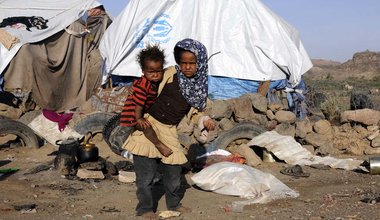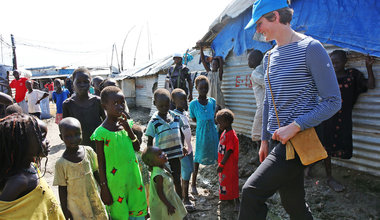Welcoming Kenya’s decision on Dadaab camp, UN urges flexibility on timeframes for Somali refugees
 The Office of the United Nations High Commissions on Refugees (UNHCR) welcomed today a statement today from the Government of Kenya in which it reiterated its continued search for solutions for refugees at the Dadaab camp, where it has been hosting and protecting refugees from Somalia for many years.
The Office of the United Nations High Commissions on Refugees (UNHCR) welcomed today a statement today from the Government of Kenya in which it reiterated its continued search for solutions for refugees at the Dadaab camp, where it has been hosting and protecting refugees from Somalia for many years.
In a press release, UNHCR praised Kenya’s commitment to “voluntary, human, safe and dignified returns in accordance with international law.”
“The voluntariness of returns is key,” the statement read.
According to press reports, Kenya said it will delay by six months the closure of the Dadaab refugee camp, the world's largest.
Earlier this summer, UNHCR said it expects the majority of the remaining refugee population to return to Somalia throughout 2017 and possibly into early 2018.
UNHCR has supported people’s returns from Dadaab for years and on 25 June 2016, it worked with the Governments of Kenya and Somalia to devise an action plan to that effect. Since 2014, some 35,000 people have received support in their voluntary returns to Somalia. A survey this summer found that 283,558 refugees were living at Dadaab, 58,000 fewer than in the past.
The agency is calling upon the Government of Kenya to be flexible in terms of a return timeframe in order to meet the different elements of the plan that was devised earlier this year, citing a concern that rigid timeframes would be difficult to meet.
“For solutions to be genuinely voluntary, people must be properly informed and able to make their individual decisions free from pressure and in full awareness of the facts.”
UNHCR is urging all stakeholders to focus their attention on the implementation of the action plan in all dimensions, not only in Kenya, but throughout the region and inside Somalia as well. In order to ensure this occurs, it recently appointed Ambassador Mohamed Abdi Affey as Special Envoy for the Somali refugee situation.
“A crucial element for the success of the action plan is for the international community to make adequate investments in Somalia in support of its progress towards security and stability,” the agency said.
“This must include much stronger assistance for the integration of returnees together with increased efforts to reduce and eventually eliminate internal displacements,” added UNHCR.
 UN
UN







